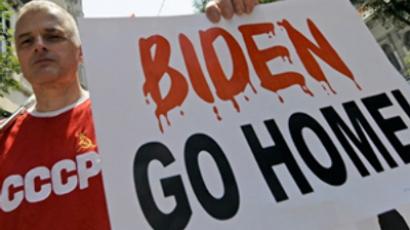Terrorism: a no-win strategy

As Moscow mourns the indiscriminate death of dozens of its citizens in a crack-of-dawn terrorist attack, the futility of terrorism in achieving its goals has been demonstrated once again.
Monday’s terrorist attacks on Moscow’s multi-million-passenger-per-day subway at the height of the rush hour has reminded the world once again that nobody is safe from the global epidemic of terrorism. Yet it also reminds the world that terrorism will never be able to break the human will. From Nord-Ost to Beslan, Russia has endured its fair share of bloodshed at the hands of terrorists, yet it maintains an unshakeable commitment to remain resilient in the face of such deplorable actions.
At an emergency meeting with senior government officials, President Dmitry Medvedev vowed to uphold the "policy of suppressing terror and the fight against terrorism."
"We will continue operations against terrorists without compromises and to the end," he said.
Indeed, Russia has proven that although such horrific acts may succeed in inflicting short-term panic and confusion, those feelings quickly give way to disgust, anger and the fierce conviction that not an inch of ground should be given to individuals who would kill innocent civilians to achieve their goals.
The Random House dictionary defines terrorism as “the use of violence and threats to intimidate or coerce, especially for political purposes.” But who would be the first to negotiate with individuals who kill the innocent in order to advance a political agenda?
"You can never prove that you are right if you kill innocent, hard working people taking the metro early in the morning and going to work," said Jerzy Buzek, the President of the European Parliament, together with his condolences. "We, in the European Parliament, offer full support to the Russian authorities in their investigations and call for those responsible to be brought to justice as soon as possible."
"People are entitled to feel safe in their everyday life," says Jose Manuel Barroso, President of the European Commission and European Union High Representative for Foreign Affairs. "We cannot allow violence to prevail over freedom and democracy."
And it is certainly not only Russia that must deal with the phantom of terror as an always-present threat that strikes anytime, anywhere, without remorse, without regret.
On July 7, 2005, three co-ordinated explosions ripped through the London’s Underground during morning rush hour in a space of 50 seconds. About one hour after the first wave of bombings, an explosion destroyed a double-decker bus that was overfilled with commuters looking for other forms of transport.
Every corner of London is now rigged with CCTV, yet these video cameras could not prevent the attacks from happening. The surveillance technology did help, however, at identifying the four suicide bombers and plot their movements in the hours before the attacks. More video surveillance may be one additional step that Moscow takes following this latest outrage.
Although 52 people were killed in the London Underground attacks and over 700 injured, the British policy toward individuals who resort to terrorism to achieve their goals is the same as every other capital in the world: we will not negotiate with terrorists.
In another past attack, Madrid suffered a series of 10 explosions on four of its commuter trains during morning rush hour on March 11, 2004; 191 people were killed and over 1,800 wounded.
Terrorism in Russia
September 4-16, 1999: a series of four apartment bombings kill 293 people in the Russian cities of Buynaksk, Moscow and Volgodonsk. The bombings are largely responsible for instigating the counter-terrorism operation in Chechnya.
August 11, 2000: A bomb in pedestrian tunnel leading to Tverskaya Metro station kills 13.
October 23, 2002: About 40 terrorists enter a Moscow theater during the "Nord-Ost" performance and take 850 people hostage. Russian forces carry out a daring rescue operation, which results in the release of some 730 hostages and the death of all the terrorists.
February 6, 2004: A suicide bomber kills 41 people in the tunnel near Avtozavodskaya Metro station in the Russian capital.
August 31, 2004: A suicide bomber blows herself up outside Rizhskaya station, killing 10 and injuring another 50.
September 1, 2004: Although every terrorist attack is deplorable, Beslan continues to carry overpowering emotions. On the official first day of school for Russian students, Chechen terrorists take 1,100 people (including 777 children) hostage inside of School Number One in the town of Beslan, North Ossetia, an autonomous republic in the North Caucasus region of the Russian Federation. The siege ends three days later in the deaths of over 300, 156 of them children.
The Madrid attacks, however, are unique in that they represent one of those rare moments when an act of terrorism actually worked to topple a government. Yet this was due more to the poor decisions of the leaders in power than the actual work of the terrorists.
In the aftermath of the carnage, and just three days before Spain’s general elections, the government of Prime Minister Jose Maria Aznar officially, and somewhat prematurely, blamed the terrorist attacks on ETA, the Basque nationalist and separatist group. But since the attacks occurred so close to elections, not to mention the fact that they happened exactly two-and-a-half years after the 9/11 terrorist attacks on the US, they were subjected to severe political interpretation – and even manipulation, some would argue.
The War in Iraq was never popular in Spain, so when the explosions struck Madrid many people believed the true culprit was al-Qaeda, as opposed to ETA, and protesters quickly took to the streets. Today, many analysts argue that the Aznar administration lost the general elections as a result of its handling and representation of the terrorist attacks, rather than the bombings per se.
By contrast, the identities of the perpetrators of the Moscow Metro attacks are immediately discernible to everyone.
In a meeting with President Medvedev, FSB chief Alexander Bortnikov said investigators believed the attacks had been carried out by "terrorist groups related to the North Caucasus.”
"This is likely to be our main conclusion, because fragments of the bodies of two female suicide bombers were found earlier at the scene of the incident and examinations show that these individuals came from the North Caucasus region," he said.
Indeed, Monday’s attacks come shortly after the death of Said Buryatsky, a notorious gang leader in Russia's North Caucasus, who was responsible for the bombing of the Nevsky Express train in November 2009 that claimed the lives of 28 people and injured over 90.
Buryatsky and five other militants were killed during a special operation in the southern Russian republic of Ingushetia on March 2. Investigators found a laboratory for making explosive devices and seized more than 1,000kg of explosives, many small arms and ammunition at the site of the special operation in Ingushetia's Nazran district.
The Nevsky Express high-speed train partially derailed on November 27, 2009 after a bomb equivalent to 7 kg (15 lbs) of TNT detonated on the track.
A police source told RIA Novosti that the gang was planning another major terrorist attack in the North Caucasus. "Buryatsky himself was training suicide bombers," the source said.
According to investigators, Said Buryatsky was also the organizer of other large-scale terrorist attacks, including the assassination attempt on Ingush President Yunus-Bek Yevkurov in June 2009, as well as the suicide bombing in Nazran in August that left more than 20 policemen dead.
In the final analysis, individuals who resort to terrorism certainly understand that their cowardly attacks against “soft targets” will never achieve any sort of positive results. Indeed, their actions may be interpreted as acts of crazed desperation; the final howl of pain of a wounded animal that lashes out blindly in one last outrage.
If there is any positive thing to come out of a terrorist attack, it certainly does not favor the terrorist. This was made clear by the very head of NATO, who sent his personal condolences to the Russian authorities.
NATO Secretary-General Anders Fogh Rasmussen condemned the Moscow terror attacks on Monday and reaffirmed his resolve to cooperate with Russia in fighting against terrorism.
"On NATO's behalf I strongly condemn today's terror attacks in Moscow," Rasmussen said in a statement to Russia. "There can be no justification for such attacks on innocent people."
NATO reaffirms its commitment to cooperate with Russia in fighting international terrorism, the secretary-general said.














